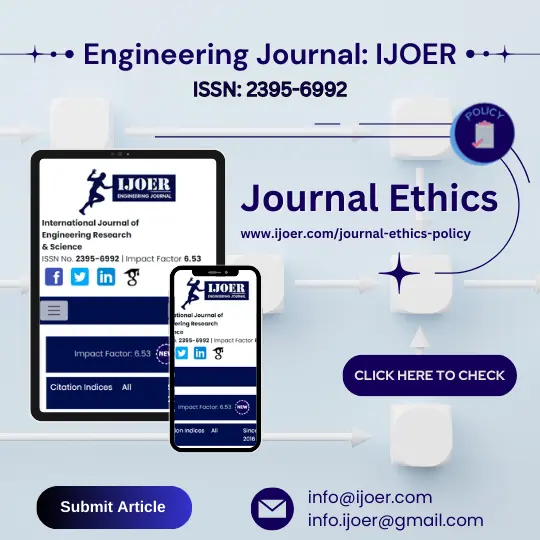
|
Citation Indices
|
All
|
Since 2020
|
Citation |
2359 |
1680 |
h-index |
19 |
15 |
i10-index |
57 |
24 |
|
Acceptance Rate (By Year)
|
|
|
Year
|
Percentage
|
|
2024
|
17.64%
|
|
2023
|
9.64%
|
|
2022
|
13.14%
|
|
2021
|
14.26%
|
|
2020
|
11.8%
|
|
2019
|
16.3%
|
|
2018
|
18.65%
|
|
2017
|
15.9%
|
|
2016
|
20.9%
|
|
2015
|
22.5%
|

We follow the COPE (Committee on Publication Ethics) guidelines, ensuring that our editorial, peer-review, and publication processes adhere to rigorous ethical standards, safeguarding the integrity of the research we publish. This policy outlines the responsibilities of editors, authors, and publishers to ensure accountability, transparency, and fairness.
Engineering Journal: IJOER adopts an Open Access publication model, ensuring that all published materials are freely available to the global community. Readers can access, download, and share published articles for non-commercial purposes without a subscription. The publication costs are covered by the authors’ institutions or research funds, ensuring wide dissemination of valuable research, particularly for developing countries.
We ensure that advertising, reprint, or other commercial revenue does not influence editorial decisions, and we maintain complete independence in our editorial process.
Editors are required to evaluate submitted manuscripts based solely on their academic merit—focusing on originality, validity, and relevance to the journal’s scope—regardless of the authors’ background, nationality, or affiliations. The Editor-in-Chief has complete authority over the editorial content and publication decisions, ensuring independence from external influences.
Editors and editorial staff must keep the details of a submitted manuscript confidential. Information about the manuscript will only be shared with relevant parties, including the corresponding author, reviewers, and the publisher, as necessary.
Editors and reviewers must not use unpublished information from submitted manuscripts for their personal research without explicit written consent from the authors. They should also avoid any conflicts of interest by recusing themselves from handling manuscripts where such conflicts exist.
The editorial team ensures that each manuscript undergoes peer review by at least two qualified reviewers. The Editor-in-Chief is responsible for the final decision, based on the manuscript’s significance, reviewers’ comments, and legal considerations such as copyright and defamation laws.
In cases of ethical concerns or allegations of misconduct, the journal will work closely with COPE guidelines to investigate, rectify, and issue retractions or corrections if necessary. The journal is committed to addressing any unethical behavior, even after publication.
Authors must provide an accurate account of their research and its significance, with enough detail to allow others to replicate the study. Fraudulent or intentionally misleading statements are considered unethical and unacceptable.
Authors may be asked to provide raw data related to their research for editorial review and should be prepared to make such data publicly accessible when possible, ensuring participant confidentiality and compliance with legal constraints.
Authors must ensure their work is original and that any use of others’ research is properly cited. Plagiarism in any form, including self-plagiarism or submitting work that is not the author's own, is strictly prohibited.
Submitting the same manuscript to more than one journal concurrently is unethical. Authors should not submit work that has been published elsewhere, except under specific circumstances with full acknowledgment and approval from the editors.
Only individuals who have significantly contributed to the research should be listed as authors. All co-authors must approve the final version of the manuscript and agree to its submission. Contributions from others should be acknowledged where appropriate.
Authors must disclose any potential conflicts of interest—whether financial or personal—that could affect the results or interpretation of their work. All sources of funding for the research should be disclosed.
For research involving human or animal subjects, authors must ensure compliance with relevant ethical guidelines and obtain necessary approvals. Informed consent from participants must be secured, and privacy rights should always be respected.
Authors must engage in the peer review process by responding promptly to editorial requests for data or clarifications and addressing reviewers’ feedback in a timely and comprehensive manner.
If authors discover significant errors or inaccuracies in their published work, they are obliged to notify the journal immediately and cooperate in issuing corrections or retractions.
The publisher works closely with the editorial team to ensure the highest standards of ethical behavior are upheld throughout the publication process. In cases of misconduct, appropriate actions, such as retractions or corrections, will be taken.
The publisher is committed to ensuring the long-term availability and accessibility of the journal’s content by maintaining partnerships with reputable archiving organizations.
If you have any questions or need further clarification, feel free to reach out to us at info.ijoer@gmail.com or info@ijoer.com. We look forward to receiving your valuable contributions to the field of engineering and science.